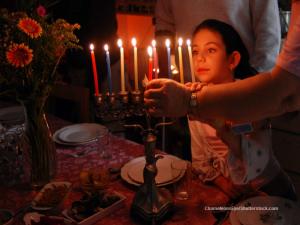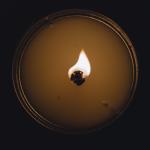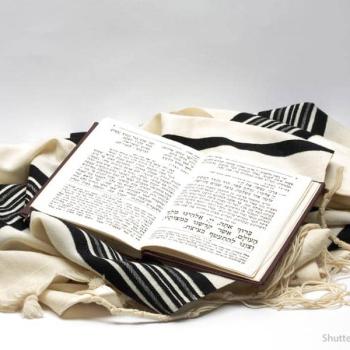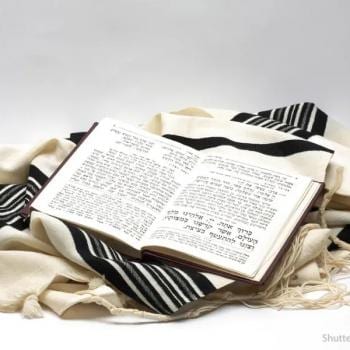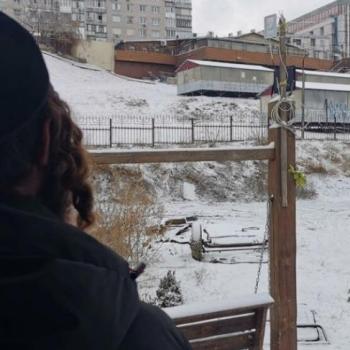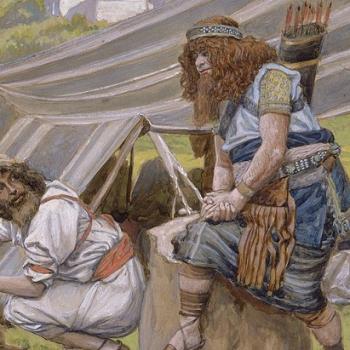The historical development of the Jewish holiday of Chanukah is a good illustration of how religious leaders can promote a “greater jihad” (spiritual) focus over a “lesser jihad” (militant) focus. The popular current explanation of Chanukah, which begins on the eve of December 2, 2018 reflects the greater jihad focus, is as follows.
By celebrating Chanukah, Jews recall the deeds of the ancient Syrian Greeks who defiled the Holy Temple and its pure olive oil which was used in lighting the two Temple menorahs. After three years of warfare the Hasmonean fighters drove the Greeks out, they came into the Temple and searched for pure oil with the seal of the High Priest; and all they found was one small jug among the many defiled ones. This single jug of oil, burnt in the two Temple menorahs, illuminated the sanctuary for eight days!
But the long-lasting oil was not the miracle of Chanukah. The true miracle was that they lit the lights of the menorah in the first place. Everyone “knew” that the small amount of oil would never be able to last for at least a week until new oil could be refined and purified.
The smart thing was to wait a week, and then start the eight-day rededication celebration; copying the way Solomon had dedicated the first Temple. The Second Book of Maccabees, which is found in Catholic Bibles, relates: “We are also told how the wise King Solomon offered a sacrifice of dedication [Chanukah] at the completion of (building) the Temple” (2 Mac 2:9) and “Solomon celebrated the festival for eight days” (2 Mac 2:12).
To kindle the menorah right away would be to expose oneself to disappointment, disparagement and recriminations if the flames died out before the new purified oil arrived. To kindle the menorah right away would be stake your reputation, and place your faith, on an positive outcome.
All human beings face similar challenges in their lives. We know that frequently faith, hope and trust can result in failures that lead to despair and cynicism. We also know that faith, hope and trust can lead to wonder-full experiences of love, courage and accomplishment.
Without eighteen centuries of faith, hope and trust, the State of Israel would never have come into existence. Without faith, hope and trust in the future, Israel will never be at peace with its enemies. Jews must believe that miracles do sometimes occur, as the blessing recited when kindling the Chanukah lights says—“in those days, and [can still occur] in these times”—because that is the only reasonable explanation for 3.500 years of Jewish existence.
The oil is the spiritual (greater jihad) lesson of Chanukah. The oil fable is first mentioned very briefly in the Babylonian Talmud some four centuries after the lesser jihad historical events, although lights have always been part of the celebration.
Lesser Jihad Story of Chanukah
For those who prefer the original lesser jihad—mundane historical and political facts of Chanukah, written down only a generation after the events—this is what the Second Book of Maccabees chapter 10 says:
Judas Maccabeus and his followers, under the leadership of the Lord, recaptured the Temple and the city of Jerusalem. They tore down the altars which foreigners had set up in the marketplace and destroyed the other places of worship that had been built. They purified the Temple and built a new altar. Then, with new fire started by striking flint, they offered sacrifice for the first time in two years, burned incense, and lighted the lamps.
After they had done all this, they lay face down on the ground and prayed that the Lord would never again let such disasters strike them. They begged God to be merciful when he punished them for future sins, and not hand them over any more to barbaric, pagan Gentiles. They rededicated the Temple on the twenty-fifth day of the month of Kislev, the same day of the same month on which the Temple had been desecrated by the Gentiles.
The happy celebration lasted eight days, like the Festival of Sukkot, and the people remembered how only a short time before, they had spent the Festival of Sukkot wandering like wild animals in the mountains and living in caves. But now, carrying green palm branches and sticks decorated with ivy, they paraded around, singing grateful praises to him who had brought about the purification of his own Temple. Everyone agreed that the entire Jewish nation should celebrate this festival each year (2 Maccabees 10: 1–8).
The military victory of the Maccabees led not only to religious freedom in Judea, but, after another two decades of intermittent warfare, also to political independence in Judea that lasted for seven to eight decades, until Rome took over.
In the year 66 CE, a little over 120 years after the Chanukah uprising began, for reasons much less important than in the days of the Maccabees, a large-scale lesser jihad rebellion against Roman governance occurred, which ended in 70 CE with the destruction of both Jerusalem and its Holy Temple.
Two generations later, another major rebellion against Rome (132-135 CE) occurred, again ending in failure. Over the following generations, the encouraging and hope-filled greater jihad rabbinic fable of the oil grew to became central, in order to overcome widespread feelings of defeat and despair among the Jewish people, and displaced the focus on the lesser jihad military victory.
Today all Jewish homes have a special candelabrum or an oil lamp holder for Hanukkah’s eight lights plus the additional light used to light the others each day. The reason for the Hanukkah lights is not to “light the house within”, but rather to “illuminate the house without,” so passersby should see it and be reminded of the holiday’s miracle. So, the lights are set up at a window near the street. Only when there was danger of anti-Semitic persecution were lamps supposed to be hidden from public view, as was the case in Persia under the rule of the Zoroastrians, or in parts of Europe over the last few centuries.
Rabbi Allen S. Maller, www.rabbimaller.com, has published over 250 articles on Jewish values in over two dozen Christian, Jewish and Muslim magazines and websites. Rabbi Maller is the author of a popular account of Jewish Mysticism entitled, “God, Sex and Kabbalah.” His most recent books are “Judaism and Islam as Synergistic Monotheisms “and “Which Religion Is Right For You?: A 21st Century Kuzari” both available on Amazon.new book ‘Judaism and Islam as Synergistic Monotheisms: A Reform Rabbi’s Reflections on the Profound Connectedness of Islam and Judaism’ (a collection of 31 articles by Rabbi Maller previously published by Islamic web sites) is now for sale ($15) on Amazon.


